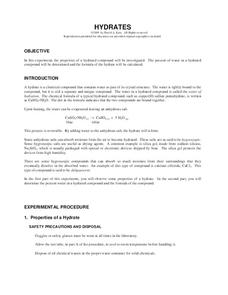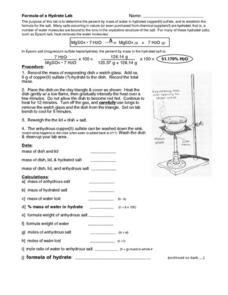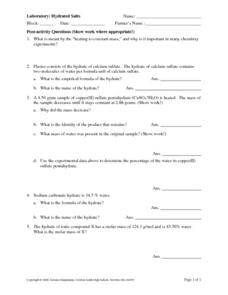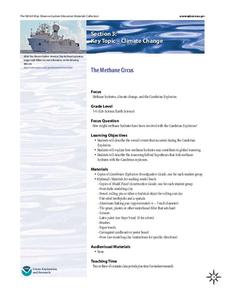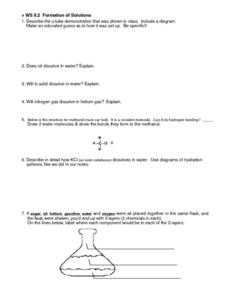American College of Sports Medicine
Selecting and Effectively Using Hydration for Fitness
How much water does your body lose during exercise? How much should you hydrate during and after exercise? Address the importance of hydration with your young athletes using this informative handout.
Royal Society of Chemistry
A Reversible Reaction of Hydrated Copper (II) Sulfate
How can removing water change the color of a substance? Lab partners remove the water of crystallization from hydrated copper (II) sulfate, record their observations, then rehydrate the solid. The resource is printable and contains ideas...
Baylor College
Water in Your Body
Do you know how much water you have had in the last 24 hours? Do you know how much your body needs? In this hands-on activity, your class members will estimate how much water our bodies lose each day by filling and emptying one-liter...
Pingry School
Determination of the Percent Hydration and the Simplest Formula of a Hydrate
Does the crystal structure of a hydrated solid determine the proportion of water absorbed, or does the application of heat change the absorption? Scholars experiment with both variables to determine the answer. They add their collected...
Curated OER
Water Alchemy
After reading "Aquatic Alchemy," an article about recapturing water for reuse when in space, your class will use calcium hydroxide or hydrated lime to purify cloudy water. Geared toward high school chemistry or environmental science...
NOAA
Methane Hydrates – What's the Big Deal?
Have you ever tried to light ice on fire? With methane hydrate, you can do exactly that. The ice forms with methane inside so it looks like ice, but is able to burn. The lesson uses group research and a hands-on activity to help scholars...
Chymist
Hydrates
What occurs when a hydrate is heated? Lead your class in exploring the answer to this question as they investigate the properties of a hydrated compound. They heat copper(II) sulfate pentahydrate and evaporate the water byproduct to...
Curated OER
Water/Hydration
Students develop an understanding of the role water has in the body and the importance of getting enough water each day. Through the lesson, students recognize the risks and signs of dehydration. Also, they identify foods with high...
Curated OER
Formula of a Hydrate Lab
In this hydrate worksheet, students find the formula of an unknown salt by determining the mass of water in the heated compound. Students burn off the water and record data to establish the final mass and formula of the hydrate.
Curated OER
Laboratory: Hydrated Salts
In this hydrated salt worksheet, learners answer questions after completing a lab experiment using a hydrated salt. The calculate the empirical formula for the hydrate, they name the hydrate and they determine the mass of the water in...
NOAA
What's the Big Deal?
Who knew that a possible answer to Earth's energy resource problems was lurking deep beneath the ocean's surface? Part four of a six-part series introduces Earth Science pupils to methane hydrate, a waste product of methanogens. After...
Curated OER
Hydrates Worksheet
In this chemistry activity, learners look for the concepts connected to hydrates and answer the variety of questions given for the assessment.
Curated OER
Hydrated Salt
Students plan, design, and carry out an experiment to determine an empirical formula for a hydrated salt X that tell students when all the water has been removed from hydrate crystals.
Curated OER
Chemical Equilibrium
In this chemical equilibrium worksheet, students review hydration, dissociation, and colligative properties. Students also review Le Chatelier's principle. This worksheet has 15 short answer questions and 12 problems to solve.
Outdoor Learning Center
Outdoor Survival
Which of the following can you survive without for the longest time: water, food, or a positive mental attitude? The answer may surprise you. Guide learners of all ages through games, activities, and discussions about surviving in the...
NOAA
Animals of the Fire Ice
When the sun's rays can't reach the producers in a food web, where does all the energy come from? Extreme environments call for extreme food sources. Young scientists investigate creatures that appear to get their energy from methane...
NOAA
The Methane Circus
Step right up! An engaging research-centered lesson, the third in a series of six, has young archaeologists study the amazing animals of the Cambrian explosion. Working in groups, they profile a breathtaking and odd creature and learn...
Curated OER
Animals of the Fire Ice
Students examine ocean life by identifying methane hydrates. In this ocean life lesson, students research organisms that live in the coldest, deepest parts of the ocean and live off methane hydrates. Students create a group...
Curated OER
Concrete Research
Students explore concrete. In this physical science and computer research instructional activity, students work in groups to answer specific questions about concrete. Each group of students completes a different worksheet with a...
Curated OER
WS 8.2 Formation of Solutions
In this solutions learning exercise, students answer questions about the solubility of various substances in solvents such as oil in water and nitrogen gas in helium. They draw water molecules to show bonding between them and they...
NOAA
Deep-Sea Ecosystems – Life is Weird!
A pool of brine in the deep sea can be up to four times as salty as the surrounding sea water. The deep sea ecosystem relies on chemosynthesis and the organisms that live there are often strange to us. The lesson plan focuses on...
Curated OER
It Is the Little Things That Count
Third graders are introduced to the importance of warm-ups, stretching, hydration and cool-downs in exercise. They perform these activities and discuss any observations.
Curated OER
Animals of the Fire Ice
Students study ice worms and describe how they interact with other species. In this methane hydrate instructional activity students study ice worms and hydrate shrimp to learn their behavior and can participate in an optional activity.
Curated OER
Photosynthetic Pictures--Are Worth More Than a Thousand Words
Students observe and examine how carbon dioxide, water, and light produce glucose/starch through a process called photosynthesis.








